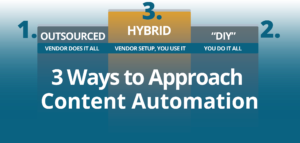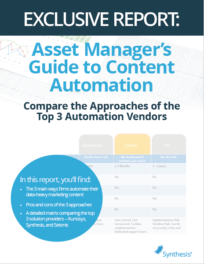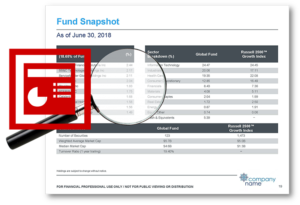What is Data Quality and why should marketers care?
 In today’s competitive business environment, marketers must have access to “the right data at the right time” in order to be effective.
In today’s competitive business environment, marketers must have access to “the right data at the right time” in order to be effective.
At financial services firms, marketers rely heavily upon their data to market their products and report performance on a monthly and quarterly basis. In addition to producing fact sheets, pitchbooks, and other vital communication materials, investment marketers are also using data to drive key business decisions.
In either case, it is extremely important for investment companies to place a focus on producing quality data. Otherwise, they risk running into problems from both a regulatory and brand reputation standpoint.
But what is the definition of “data quality”? Why is it important for marketing? And what is the magic formula for achieving quality data?
A few weeks ago, I had the pleasure of sitting down with Maria C. Villar, Managing Director of Business Data Leadership, author, and instructor at eLearningCurve. She was kind enough to answer my questions on data quality and offer some expert insight on the topic.
 |
Maria C. Villar, Managing Director of Business Data Leadership, author, and instructor at eLearningCurve. |
Maria, what’s your background in data management and data quality?
I have spent the last 20 years of my career building Data Governance programs for various companies of various sizes. I’ve led very large organizations in a variety of industries, including financial services and technology. In addition to being a practitioner, I’ve written books, created educational courses for eLearningCurve, and have published quite a few articles on this topic as well.
Tell me about your book, ‘Managing your Business Data: From Chaos to Confidence’. Why did you write it?
I coauthored the book with a colleague of mine in 2009. The two of us worked together in one of the large companies that I had talked about. She was representing marketing as a business owner for marketing and marketing analytics. I was working at the time for the CIO’s office running the Governance program. The two of us had a very good working relationship.
At the time, this whole idea of Data Governance and Data Management was not really talked about in the business world at all. If anything, it was talked about in the context of data warehouses or data IP-related projects, but not in terms of the work that the business leaders needed to do. We felt it was very big gap that needed to be addressed with our book.
That’s why it’s called “Managing Your Business Data from Chaos to Confidence.” It is really not meant for IT people. It is meant for a business leader, like a marketing person, that is really struggling with their data. Think of it in terms of all of the issues around quality, reliability, and trust in the data. Instead of turning it over to IT and saying, “Fix it,” it’s getting involved in a business driven Data Governance program that will ultimately yield reliable, high quality data. So it was really with the businessperson in mind and not a technical person.
How do you differentiate between Data Governance, Data Management, and Data Quality? Are the distinctions important?
There are various points of view on this particular topic, and I have had raging debates with some of my peers on this who think Data Quality is the overall program. However, I fundamentally believe that the overall program starts with establishing a comprehensive enterprise information strategy. Within that strategy, there are various capabilities that you’re trying to develop. Ultimately what you want to develop is high quality data. But in order to generate high quality data you need effective Data Management. So in other words, Data Quality is the outcome of effective Data Management.
Data Management, to me, is a combination of processes, tools, systems, and capabilities that you build inside of a company. When you put them all together, it creates highly reliable, high quality data. Data Governance then is just one part of your overall Information strategy. It’s a part of your program that is about establishing standards, policy, and the oversight to make that happen.
So if you were to draw an umbrella, the overarching umbrella would be Information Management. Then within Information Management, you’ve got Data Governance, tools, and processes which work together to produce highly reliable, highly efficient, timely data of high quality. That’s a good way to think about it.
How do you differentiate between Information Management and Data Management? Is there really a difference?
I will not differentiate between Information Management and Data Management. Some experts will say one is of a higher order than the other. I don’t believe in that. I think they’re one in the same.
Most people who are not immersed in it don’t know the difference either. If you ask a businessperson, “Is it Data Management or Information Management?” they’ll look at you like, “What are you even talking about? Why are we spending time on that topic?” It’s not a relevant topic for them.
What about Data Stewardship? What role does it play in the organization?
That’s really a good question. So Data Stewardship is under the category called ‘Data Governance.’ It’s really one of the key roles in a Data Governance program to drive accountability for data. So a Data Steward will be charged with some data topic. It could be a Data Steward for customer data. It could be a Data Steward for vendor data.
Then that person is charged with driving all of the programs that need to be driven in order to produce high quality customer-vendor data. So if there are processes or systems that need to change, they would define the standards, to follow. For example: What are the mandatory fields? Or, what are the Data Quality criteria? A Data Steward is really the point person for that data topic in the company. It’s one of the best practice methods in our industry for establishing accountability for data in your company.
Nothing happens if you don’t appoint somebody. That’s why a lot of times the Chief Data Officer roles have Governance under their umbrella. They assign these other responsibilities because someone needs to make it happen. That’s what the Chief Data Officer does and that’s what the Data Steward does. They don’t do all the work, but they’re the lead people in charge that may build up the team and then get the work done across the company.
Do you see a difference in the types of Data Management challenges at small firms versus large firms?
That’s an interesting question. I think both large and small companies have many similar challenges. Certainly smaller companies are going to be challenged more by resources and the ability to fund and make a major investment in this area whereas larger companies have more resources at their disposal. But, overall, I’ve found that medium-sized companies all the way up to very large ones have the similar challenges when it comes to getting the program up and running. Many of the problems around Data Management and Data Quality problems stem from the same root-causes, and many of the ways in which you solve them are also going to be the same. It doesn’t really matter if it’s a company with over 300,000 employees, one with 75,000 employees, or 6,000 employees. Based on my experience managing information governance programs, there are a lot more similarities than there are differences.
At what point should a firm make the investment in a Data Management Program?
Well there are usually three drivers of Data Management and Data Quality programs.
The first one is the company has a known Data Quality problem, and it becomes very obvious that they have to solve this problem. So it’s some sort of a crisis. They may have a customer data issue where they have sent mass mailings out to the wrong people in an embarrassing way. That could be one, or they sent an invoice to the wrong people or the wrong company. So there can be a crisis that causes the company to really say, “We have to solve this problem.”
The second way that companies get involved would be if it was mandated by a regulator or a legal reason. Examples include financial reporting SOX requirements, privacy regulations that have strict fines if some of your data is compromised, or it could even be a security reason. Regulated companies are in the financial services or the health field will be driven to start a governance program to satisfy these requirements. So they’re driven by some sort of outside, external, legal, financial reason to do this.
The third could be that there’s some big initiative that the company is going through. Maybe they’re moving to a cloud infrastructure. Maybe they’re trying to get some analytics around their customers, vendors, or partners. They realize that in order to drive that business insight, they need to look at the foundational data that creates that insight and fix the Data Quality problem before they can trust the insights and the reporting that they’re going to get. So that’s more internally driven.
It’s not like a company (especially a small business) wakes up one day, reads an article on Data Governance, and says, “Wow, this is really something cool and new. I need to try it!” There’s usually some fundamental business driver that is very dependent on data for which if you don’t manage the data in some way, you’ll either have a penalty or the program itself won’t reap its reward.
Many investment marketers are challenged with getting data in a clean and consistent form to create their fact sheets and other communication materials. In many cases, the investment companies they work for already have data warehouses in place, but they don’t serve the specific and unique needs of the marketing department. Why does this happen?
Many companies don’t tackle all the critical data with a top-down, enterprise-wide program because it’s a lot to bite-off. So companies usually start off a governance program in one area. Data Governance programs usually start in one area where they know their data is bad, and they go address it. But it’s really important that even if you start off in one area that you fundamentally think about solving the problem in a root-cause way, in the originating systems, with the right processes changes and the right systems changes. It’s okay to start with only one area, but you’ve got to do it in a way that will benefit more than just one silo or group. So you can start off small, but think in terms of the broader solution, tools, and enterprise because that’s where your program is going to go when you’re successful.
Now what makes it important not to do is only solve it within the system that marketing uses. So a lot of times what companies will do is say, “Oh I have a Data Quality issue. Well I’ll just bring that data over into my marketing and environment and I’ll fix the data right in my marketing environment.” Then it’s good for marketing and it doesn’t really solve the holistic problem that the data was bad at the source.
How does good Data Governance give a company a competitive advantage?
Good Data Governance is like water. It’s the pipe. It’s the electricity that runs every part of the company. So the more confidence you have in the underlined foundational data that you have, the faster you can make decisions and the faster you can really go after your customers with more information about them. But governance is really more than just technology. I think that’s an important point.
It can be fundamental in getting closer to your customers, but also to efficiently running your company. If you don’t have to stop and fix data or endlessly search for information because it’s not where you need it when you need it. So there’s a lot of process efficiency and employee productivity that can be gained from this.
Then on top of that, you have this whole new train of data called Big Data and Predictive Analytics. Those kinds of solutions really provide great insight to companies and great competitive advantage if used correctly. But at the core of it is this: Do you trust the data that is going in? Data Governance is about having confidence in your data. It’s really a fundamental way in which you guarantee your data is meeting your business requirement, and it’s a competitive advantage to just about any process that uses data.
The converse is also true too, right? If you look at the statistics, the statistics tell you that about 40% of all business initiatives fail because of bad data.
Wow. That is a startling statistic….
Not many people know that correlation. So not only is it foundational to making your business initiative successful (especially for highly intensive data programs, business initiatives, and business priorities), but if you don’t do it, there is a penalty. It’s not like, “Well if you don’t do it, so what?” There is a ‘so what’. The ‘so what’ is then the business benefits you think you’re going to get in your predictions, growth formulas, and sales you’re not going to get because it’s not based on solid, highly efficient Data Quality.
Thank you for reading! If you liked this post, feel free to share it. You can also subscribe to our blog to get new posts right to your inbox.
Here are some related resources that might interest you:








 Compare the Top 3 Finserv Content Automation Vendors [White paper]
Compare the Top 3 Finserv Content Automation Vendors [White paper] Create Pitchbooks the Drive Sales [White paper]
Create Pitchbooks the Drive Sales [White paper] Build vs. Buy: Should Your Financial Services Firm Outsource or Insource Marketing Technology? [White paper]
Build vs. Buy: Should Your Financial Services Firm Outsource or Insource Marketing Technology? [White paper]  10 Tips for Rebranding your Fund Marketing Documents [White paper]
10 Tips for Rebranding your Fund Marketing Documents [White paper]




